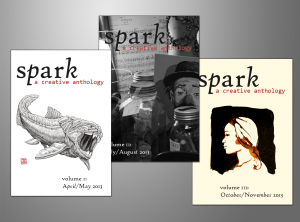This week, I’m off visiting Tina Pollick as a guest on her blog for a three-part interview series about Spark: A Creative Anthology. Part 1 was “Interview with editor Brian Lewis.” Part 2, posted today, features a discussion with some of the authors and poets already accepted for publication in upcoming volumes of Spark. Be sure to join us for the whole discussion at tinapollick.com!
Here is a preview.
Tina Pollick: My guests for this preview are John Stocks, j.lewis and George Wells. Thank you for joining me.

Writers have different sources of inspiration. I was wondering: What inspired you to write your first story, poem, or book?
John Stocks: A teacher at secondary school encouraged me to contribute to an anthology of creative writing, which was produced by the school. In doing so they planted a seed that has only recently grown into a committed programme of work with people in my local community, leading community workshops and enabling others to experience the therapeutic beauty of reflective and creative self-expression, and the thrill of being published. The latest incarnation of this magazine, GANDA, Diverse Visions, launched in Sheffield, UK, in the last week of November.
j.lewis: The first poem I remember writing was about Robin Hood and Maid Miriam, inspired by reading a book about Robin Hood from the school library. I was eight years old, the poem was 3 or 4 pages long, and my mother didn’t believe I could have possibly written it. I was crushed and elated.
George Wells: I was told that I could write throughout all of elementary and high-school, and enrolled in a course in college. I didn’t finish a story in that class, only a few sketches. The project for the semester was to be a novel. I freaked out and dropped the class. I didn’t write another word of fiction for over ten years, but even then I couldn’t continue. I finally started to write seriously when I turned forty. I didn’t finish that story, but it’s still in my archives, and I hope to get back to it one of these days. I think more than anything, I needed the age and wisdom to say, “Why not?” and not be afraid anymore.
Tina Pollick: I, for one, am glad that you decided to write again, George. If you could choose one writer as a mentor, who would it be?
George Wells: Just one? Annie Dillard, Annie Proulx, Fannie Flagg are constant favorites, but the writer that always blew me away was Kurt Vonnegut. He hit all emotions in his writing, consistently, and in every story. In fact, I remember confronting my English teacher in my junior year of high-school, asking him why Breakfast of Champions wasn’t required reading. He laughed, and told me that he’d lose his job if he were to put that on the list.
I think that reading early on is a huge asset. Some stories that we read as children or young adults really stick with us. In some ways those books influence what kind of writers we may become.
Tina Pollick: j.lewis, you’re a poet, what other poets have influenced your writing?
j.lewis: Carl Sandburg was the first poet I read that wrote in free verse, and that freed me from the notion that all poetry had to rhyme and be rigidly metered to be good. e. e. cummings made a strong case for lower case, and I have adopted that for the majority of what I write.
Tina Pollick: George, have any writers influenced your writing?
George Wells: Annie Dillard, Annie Proulx, Kurt Vonnegut, Douglas Coupland. For dialog, I think that John Sayles has taught me the most about realistic conversations that are cleaner than real life without sounding false.
Tina Pollick: If you don’t mind, I’d like to get a little personal. What writers or works have influenced your life?
George Wells: For the Time Being, by Annie Dillard. I’ve read it so many times that the book has fallen apart. It seems random at first, but I love walking with her on her spiritual journey. It also has one of my favorite quotes, “For the world is as glorious as ever, and exalting, but for credibility’s sake let’s start with the bad news.” Douglas Coupland’sLife after God spoke to my own search for God, and I’ve read that many times as well.
Tina Pollick: And j.lewis, a slight twist on the same question: are there any poems or poets that have influenced your life?
j.lewis: Arthur H. King, one of the most intelligent, educated people I have had the pleasure to know, had an uncanny ability to make me feel simultaneously utterly ignorant, yet totally capable of being his equal. He exposed me to the concept of “literary trash”, which he defined as any writing that was not honest, or that attempted to manipulate the reader into a desired response. By extension, he made it clear that manipulating other people in everyday life was equally inexcusable.
Tina Pollick: Thank you, John, j.lewis, and George for being my guests. Interesting and thought provoking answers. I look forward to finishing this conversation on my blog, where we will be joined by other Spark authors.
Continue to Part 3: Responses to Reader Questions

Pingback: “Ask the Editor” Interview with Tina Pollick – Part 3: Responses to Reader Questions | Spark: A Creative Anthology
Pingback: “Ask the Editor” Interview with Tina Pollick – Part 1 | Spark: A Creative Anthology